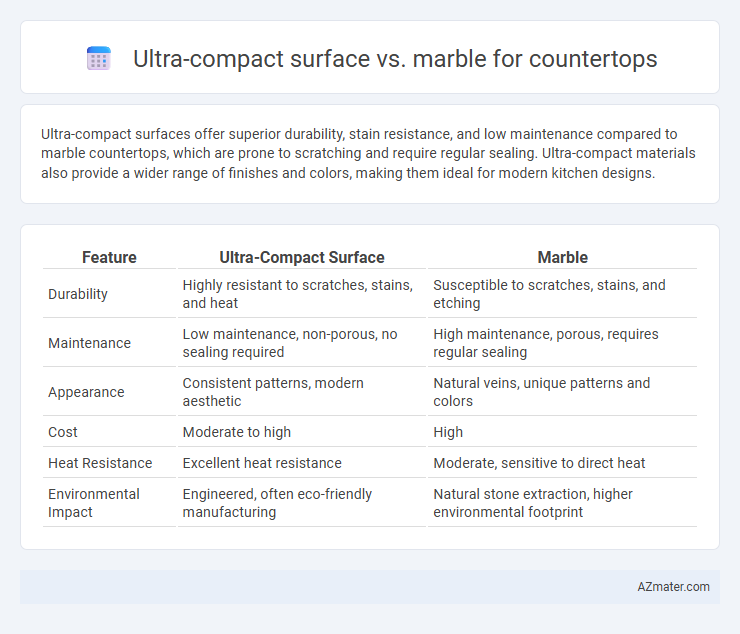Ultra-compact surfaces offer superior durability, stain resistance, and low maintenance compared to marble countertops, which are prone to scratching and require regular sealing. Ultra-compact materials also provide a wider range of finishes and colors, making them ideal for modern kitchen designs.
Table of Comparison
| Feature | Ultra-Compact Surface | Marble |
|---|---|---|
| Durability | Highly resistant to scratches, stains, and heat | Susceptible to scratches, stains, and etching |
| Maintenance | Low maintenance, non-porous, no sealing required | High maintenance, porous, requires regular sealing |
| Appearance | Consistent patterns, modern aesthetic | Natural veins, unique patterns and colors |
| Cost | Moderate to high | High |
| Heat Resistance | Excellent heat resistance | Moderate, sensitive to direct heat |
| Environmental Impact | Engineered, often eco-friendly manufacturing | Natural stone extraction, higher environmental footprint |
Introduction: Ultra-Compact Surface vs Marble Countertops
Ultra-compact surfaces outperform marble countertops in durability and maintenance, offering high resistance to scratches, stains, and heat. Engineered from mineral composites, ultra-compact countertops provide consistent color and pattern, unlike natural marble, which varies and requires regular sealing. Their non-porous nature makes ultra-compact materials more hygienic and easier to clean, ideal for modern kitchen environments.
Material Composition and Manufacturing Process
Ultra-compact surfaces consist of a blend of natural minerals, pigments, and organic resins, compressed at high pressure and temperature to create a dense, non-porous material known for exceptional durability and stain resistance. Marble, primarily composed of calcite or dolomite, forms through metamorphic processes, resulting in a natural stone with unique veining but higher porosity and susceptibility to etching and staining. The manufacturing process of ultra-compact surfaces involves industrial pressing and curing methods that produce uniform slabs with consistent thickness and color, contrasting with marble slabs that require cutting and polishing from natural quarries, leading to variability in appearance and performance.
Aesthetic Appeal and Design Versatility
Ultra-compact surfaces offer a sleek, modern aesthetic with uniform patterns and vibrant color options that maintain their appearance over time, making them ideal for contemporary kitchen designs. Marble provides a timeless, natural beauty with unique veining and subtle color variations, adding elegance and character to any space. Ultra-compact materials boast greater design versatility due to their ability to mimic other textures and withstand customization, while marble excels in classic and luxurious interior styles but requires more maintenance to preserve its look.
Durability and Scratch Resistance
Ultra-compact surfaces, composed of dense materials like finely ground quartz and porcelain, exhibit superior durability and scratch resistance compared to traditional marble countertops. Marble, a natural stone, is more porous and prone to scratches and etching from acids, requiring regular sealing to maintain its appearance. Ultra-compact surfaces maintain their structural integrity and resist everyday wear, making them ideal for high-traffic kitchen environments.
Stain and Heat Resistance Comparison
Ultra-compact surfaces outperform marble in stain resistance due to their non-porous composition, which prevents liquids and oils from penetrating and causing discoloration. Marble, a natural stone, is porous and susceptible to staining from acidic substances like wine, coffee, and citrus, requiring frequent sealing to maintain its appearance. Regarding heat resistance, ultra-compact surfaces withstand temperatures up to 300degC without damage, whereas marble can crack or discolor under direct contact with hot pots and pans, necessitating the use of trivets or heat pads.
Maintenance and Long-term Care
Ultra-compact surfaces offer superior resistance to stains, scratches, and heat, making them easier to maintain compared to marble, which requires regular sealing and careful cleaning to prevent etching and discoloration. Marble countertops are porous and more susceptible to damage from acidic substances, requiring ongoing polishing and protective treatments to preserve their appearance over time. Ultra-compact materials provide long-term durability and minimal maintenance, making them a practical choice for high-traffic kitchen environments.
Cost Analysis: Initial Investment and Lifespan
Ultra-compact surfaces typically demand a higher initial investment compared to marble, with prices ranging from $70 to $120 per square foot, while marble costs typically fall between $50 and $100 per square foot. Despite the higher upfront cost, ultra-compact surfaces offer superior durability and stain resistance, extending their lifespan to over 25 years with minimal maintenance, whereas marble requires more frequent sealing and is prone to etching, often lasting around 15 to 20 years. When factoring in maintenance, replacement, and repair expenses, ultra-compact surfaces can present better long-term value despite the higher initial expense.
Environmental Impact and Sustainability
Ultra-compact surfaces offer a lower environmental impact compared to marble, as they are often produced using advanced technologies that minimize waste and energy consumption during manufacturing. These materials typically have higher durability and resistance to stains and scratches, extending the countertop's lifespan and reducing the frequency of replacements. Marble, a natural stone, requires extensive quarrying processes that contribute to habitat disruption and carbon emissions, though it remains biodegradable and recyclable at end-of-life.
Installation Process and Considerations
Ultra-compact surfaces offer a lightweight and thinner profile compared to marble, simplifying the installation process and reducing labor costs. Their pre-fabricated slabs often come with consistent thickness and easier handling, while marble requires skilled artisans to accommodate its natural variability and heavier weight. Considerations include ultra-compact's enhanced durability and less porous nature, which minimizes sealing needs, whereas marble demands regular sealing and careful installation to prevent cracking and staining.
Which Countertop is Right for You?
Ultra-compact surfaces offer superior resistance to heat, scratches, and stains, making them ideal for high-traffic kitchens needing durability with minimal maintenance. Marble provides classic elegance and unique veining patterns but requires regular sealing and is prone to etching and staining in busy cooking environments. Choosing the right countertop depends on your lifestyle priorities: ultra-compact suits modern durability demands, while marble appeals to those valuing timeless aesthetics despite higher care requirements.

Infographic: Ultra-compact surface vs Marble for Countertop
 azmater.com
azmater.com